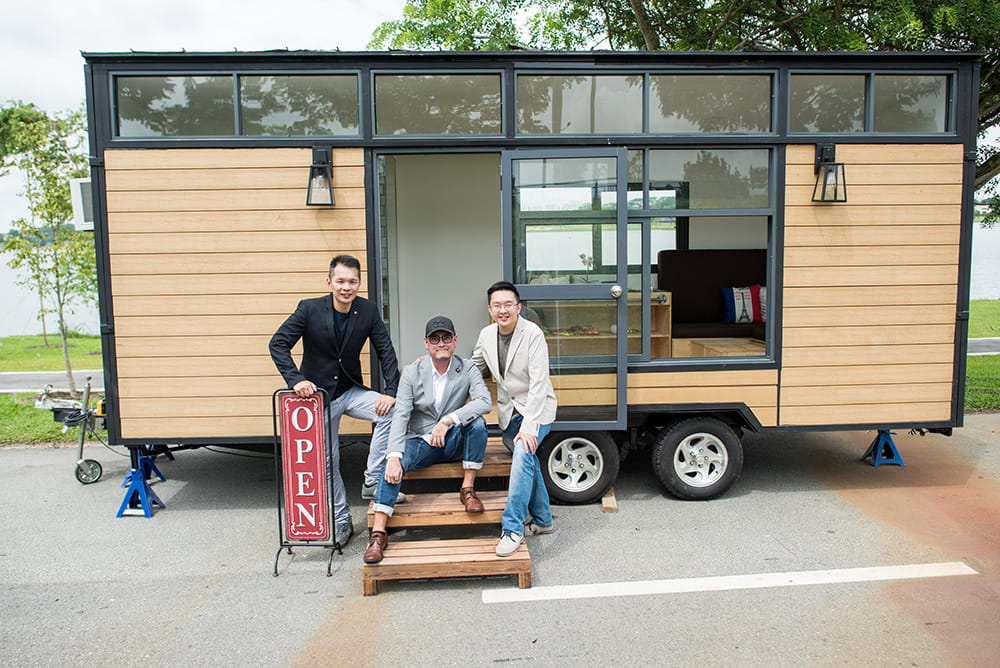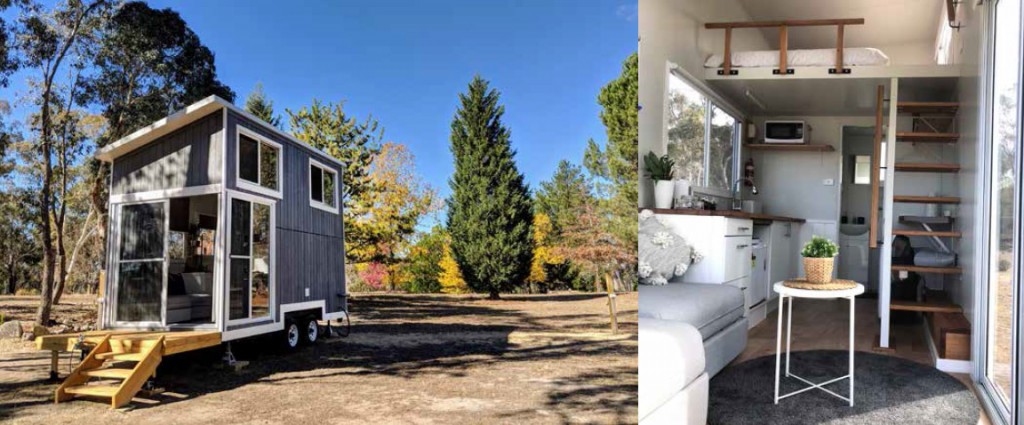Stories > Little Wonders
Little Wonders
A Singapore start-up integrates environmental awareness and stunning scenery into a tiny, portable package.
BY Alywin Chew
t’s no secret that the most remote parts of the world often offer some of the most mesmerising sights. Unfortunately, not everyone gets to stay in these places due to a lack of lodging facilities. A Singapore start-up called Big Tiny is trying to change that.
It all began on a holiday in the idyllic Australian countryside, where co-founder Adrian Chia was moved by its stunning scenery. Eager to let others experience the same beauty and serenity, the expert in business development teamed up with two long-time buddies – material science specialist Jeff Yeo and designer-builder Dave Ng – to set up Singapore’s first company that integrates the “tiny-house” initiative with eco-tourism.
The former refers to the social movement – believed to have started in the United States over 10 years ago – where people choose to live in small homes for reasons such as reducing their environmental footprint and attaining greater financial flexibility.

from left: Dave Ng, Jeff Yeo and Adrian Chia make up the threeman team behind Singapore’s first company integrating the “tiny-house” initiative with ecotourism.
Apart from being built with less materials, such homes feature lower energy consumption. The trio had initially planned to acquire farms in Australia, but decided to opt for something more sustainable and easily scalable.
“Research from the US in 2010 found that the most effective way to lessen the negative environmental impact of a home is to reduce its size. Not only does this lead to lower energy usage but also the amount of materials used to build the home,” explains Yeo.
FAT OF THE LAND
In March 2017, the three Singaporeans took the leap. They pooled $100,000 to set up their company selling prefabricated homes on wheels.
Each of these – ranging in length from a 4.8m-long house covering 186sqf to a 7.2m-long one occupying 240sqf – are equipped with a kitchen, multifunctional furniture, rainwater collection system, composting toilet and solar panels. The homes are insulated with rockwool, which is free from environmentally toxic chlorofluorocarbons, hydrofluorocarbons and asbestos.
“Through Our Partnership, [farmers] Can Now Achieve A Sustainable Source Of Secondary Income From The Rental Yields As Well As The Activities They Offer.”
Jeff Yeo, Co-founder Of Big Tiny
Taking the tiny house movement a step further, Big Tiny collaborates with individuals living in remote regions, such as farmers and vineyard owners, to have their customers’ units parked on their premises.
These locals play the role of hosts and get a slice of the profits when the mobile homes are rented out – on platforms such as Airbnb and Booking.com – to tourists.
“Farmers are often at the mercy of the weather when it comes to their income,” shares Yeo. “Through our partnership, they can now achieve a sustainable source of secondary income from the rental yields as well as the activities they offer.”
Big Tiny’s homes can now be found in Australian states such as Victoria and New South Wales, which are frequently visited by Singaporeans. So far, the reception to their concept has been positive.
The company has sold more than 50 units, mostly to customers from Singapore, Malaysia and Australia. Rental wise, the homes are usually fully booked on weekends and public holidays. One of them was even booked for six months.
LANDING DEALS
Before they even got to offering holiday homes, however, convincing landowner of their business model was an uphill climb.
“We simply went about knocking on doors and making cold calls when we first started. Needless to say, we were rejected on more than a few occasions,” shares Yeo.
But the determined trio persevered, overcoming their prospective partners’ doubts with sincerity and honesty.
“After sharing with them our financial projections, as well as the potential benefits to both the environment and themselves, they eventually decided to give it a shot.”
“The Singapore Team Has Put Their Faith In Us As Much As We Have Put Our Faith In Them. They Have Shown Us That Nothing Is A Problem. It’s An Absolute Pleasure Working With Them And For Them.”
Patreece Griffiths, Who Has A Big Tiny Mobile Home Parked On Her Blue Mountains Property
The trio also got to learn more about their partners in the process. Yeo says that while some Australians initially appeared unfriendly, further interaction with them proved otherwise.
“We felt slightly intimidated when making first contact with them as they seemed rather cold,” recalls Yeo. “But after breaking the ice, we came to realise that they are the exact opposite of that. People living in the rural parts of Australia tend to be hospitable and enthusiastic, which helps visiting guests feel welcome.
This is how we have managed to get Superhost status on Airbnb twice in a row within a year,” he adds.
The homesharing platform awards this status to its top-rated and most experienced hosts. Patreece Griffiths, who has a Big Tiny mobile home parked on her property located at the foot of the Blue Mountains near Sydney, revealed a similar sense of apprehension during her first encounter with Chia and his friends.

Big Tiny operates on the premise that smaller homes not only consume less energy, they also require less materials to build.
“Initially, we were skeptical and not too sure what to make of things. Australians may be laid-back, but we are cautious at the same time,” says Griffiths, who runs an event business. “However, after our first meeting, my husband and I both knew that the company had a genuine interest in Australia.”
Besides benefitting from the additional income, Griffiths shares that she has hosted many lovely guests. Working with the team from Big Tiny has also given her new cultural insights.
“The Singapore team has put their faith in us as much as we have put our faith in them. They have shown us that nothing is a problem. They are calm, patient and extremely hard-working. It’s an absolute pleasure working with them and for them.”
The Big Tiny team and their Australian partners frequently engage in discussions on how they can improve the eco-friendliness of the homes while encouraging more people to join the movement.
“Saving the planet is something that we can do, a little step at a time,” says Yeo. Little as their houses may be, Big Tiny has big dreams.
They are planning to expand their footprint to more places in Australia, as well as in New Zealand, Thailand, Malaysia, Indonesia and the United Kingdom within the next five years.
